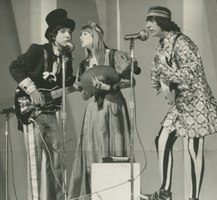
Back Мутантис Bulgarian Os Mutantes Catalan Os Mutantes Czech Os Mutantes German Os Mutantes Esperanto Os Mutantes Spanish Os Mutantes Finnish Os Mutantes French Os Mutantes Galician אוס מוטנטס HE
Os Mutantes | |
|---|---|
 Os Mutantes in 1969 | |
| Background information | |
| Origin | São Paulo, Brazil |
| Genres | |
| Years active | 1966–1978 2006–present |
| Labels | Polydor/Universal, Som Livre, Sony BMG (Brazil) Omplatten/Polydor/Universal, Luaka Bop, ANTI-, Krian Music Group (US) |
| Members | Sérgio Dias Esmeria Bulgari Vinicius Junqueira Henrique Peters Cláudio Tchernev[6] |
| Past members | Cláudio César Dias Baptista Arnaldo Baptista Rita Lee Liminha Dinho Leme Manito Rui Motta Túlio Mourão Antônio Pedro Luciano Alves Paulo de Castro Fernando Gama Zélia Duncan Bia Mendes Fabio Recco Ani Cordero Amy Crawford |
Os Mutantes (Brazilian Portuguese: [uz muˈtɐ̃tʃis], The Mutants) are an influential Brazilian rock band that were linked with the Tropicália movement, a dissident musical movement during the Brazilian dictatorship of the late 1960s. The band is considered to be one of the main groups of Brazilian rock. Heavily influenced by Anglo-American psychedelic pop,[7] they bridged Brazilian sensibilities together with studio trickery, feedback, distortion, and musique concrète.[8] They released their now-acclaimed self-titled debut album in 1968.
Os Mutantes debuted their work in 1966, as a trio, when they presented themselves in the program O Pequeno Mundo de Ronnie Von of TV Record. The group was christened Mutantes by Ronnie Von himself, right before their first TV appearance. The group until then called themselves Os Bruxos (meaning The Witches, in Portuguese) and the suggestion came from the book Emperor of the Mutants, by Stefan Wul (the book's original title in French is La Mort Vivante). The group quickly became one of the main figures of the "new MPB" (popular Brazilian music), influenced by Tropicália, until their breakup in 1978, only with Sérgio Dias as an original member. Throughout these twelve years, nine albums were recorded, although two of them – O A e o Z and Tecnicolor – were only released in the 1990s. It was during this later decade that the importance of Os Mutantes was recognized, by both national and international rock, as one of the most creative dynamic, radical and talented groups of the psychedelic era.
Although the original line-up (Rita Lee, Arnaldo Baptista and Sérgio Dias; and later with Liminha and Dinho Leme) made the most notable breakthrough for the group, it has gone through numerous personnel changes throughout its existence. After a hiatus from the late 1970s to the early 2000s, the band reunited in 2006, touring and recording new material.
- ^ Appiah, Anthony; Gates, Henry Louis (2005). Africana: The Encyclopedia of the African and African American Experience. Oxford University Press. p. 222. ISBN 978-0-19522-329-3.
- ^ Cite error: The named reference
amgwas invoked but never defined (see the help page). - ^ Powell, Mike. "Os Mutantes Mutantes ao Vivo: Barbican Theatre, Londres 2006". Pitchfork. Retrieved 29 November 2021.
- ^ Balderston, Daniel; Gonzalez, Mike; Lopez, Ana M. (2000). Encyclopedia of Contemporary Latin American and Caribbean Cultures. Routledge. p. 845. ISBN 978-1-13478-852-1.
- ^ Hernandez, Deborah Pacini; l'Hoeste, Héctor D. Fernández; Zolov, Eric (2004). Rockin' Las Américas: The Global Politics of Rock in Latin/o America. University of Pittsburgh Press. p. 354. ISBN 978-0-82297-255-6.
- ^ Nunes, Samuel (9 August 2013). "'Nossa internet era o rádio amador', lembra Sérgio Dias, dos Mutantes". G1 (in Portuguese). Retrieved 29 October 2013.
- ^ Sérgio Dias Interview
- ^ Bush, John. "Biography & History". AllMusic. Retrieved 25 December 2021.
© MMXXIII Rich X Search. We shall prevail. All rights reserved. Rich X Search